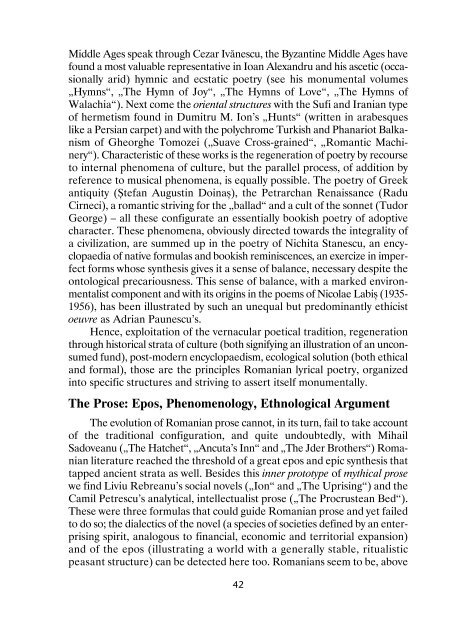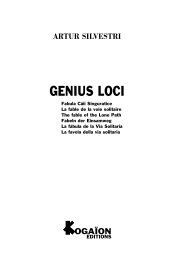PENTAGRAMMA - ROMANIAN LIBRARY
PENTAGRAMMA - ROMANIAN LIBRARY
PENTAGRAMMA - ROMANIAN LIBRARY
Create successful ePaper yourself
Turn your PDF publications into a flip-book with our unique Google optimized e-Paper software.
Middle Ages speak through Cezar Ivãnescu, the Byzantine Middle Ages have<br />
found a most valuable representative in Ioan Alexandru and his ascetic (occasionally<br />
arid) hymnic and ecstatic poetry (see his monumental volumes<br />
„Hymns“, „The Hymn of Joy“, „The Hymns of Love“, „The Hymns of<br />
Walachia“). Next come the oriental structures with the Sufi and Iranian type<br />
of hermetism found in Dumitru M. Ion’s „Hunts“ (written in arabesques<br />
like a Persian carpet) and with the polychrome Turkish and Phanariot Balkanism<br />
of Gheorghe Tomozei („Suave Cross-grained“, „Romantic Machinery“).<br />
Characteristic of these works is the regeneration of poetry by recourse<br />
to internal phenomena of culture, but the parallel process, of addition by<br />
reference to musical phenomena, is equally possible. The poetry of Greek<br />
antiquity (ªtefan Augustin Doinaº), the Petrarchan Renaissance (Radu<br />
Cirneci), a romantic striving for the „ballad“ and a cult of the sonnet (Tudor<br />
George) – all these configurate an essentially bookish poetry of adoptive<br />
character. These phenomena, obviously directed towards the integrality of<br />
a civilization, are summed up in the poetry of Nichita Stanescu, an encyclopaedia<br />
of native formulas and bookish reminiscences, an exercize in imperfect<br />
forms whose synthesis gives it a sense of balance, necessary despite the<br />
ontological precariousness. This sense of balance, with a marked environmentalist<br />
component and with its origins in the poems of Nicolae Labiº (1935-<br />
1956), has been illustrated by such an unequal but predominantly ethicist<br />
oeuvre as Adrian Paunescu’s.<br />
Hence, exploitation of the vernacular poetical tradition, regeneration<br />
through historical strata of culture (both signifying an illustration of an unconsumed<br />
fund), post-modern encyclopaedism, ecological solution (both ethical<br />
and formal), those are the principles Romanian lyrical poetry, organized<br />
into specific structures and striving to assert itself monumentally.<br />
The Prose: Epos, Phenomenology, Ethnological Argument<br />
The evolution of Romanian prose cannot, in its turn, fail to take account<br />
of the traditional configuration, and quite undoubtedly, with Mihail<br />
Sadoveanu („The Hatchet“, „Ancuta’s Inn“ and „The Jder Brothers“) Romanian<br />
literature reached the threshold of a great epos and epic synthesis that<br />
tapped ancient strata as well. Besides this inner prototype of mythical prose<br />
we find Liviu Rebreanu’s social novels („Ion“ and „The Uprising“) and the<br />
Camil Petrescu’s analytical, intellectualist prose („The Procrustean Bed“).<br />
These were three formulas that could guide Romanian prose and yet failed<br />
to do so; the dialectics of the novel (a species of societies defined by an enterprising<br />
spirit, analogous to financial, economic and territorial expansion)<br />
and of the epos (illustrating a world with a generally stable, ritualistic<br />
peasant structure) can be detected here too. Romanians seem to be, above<br />
42



